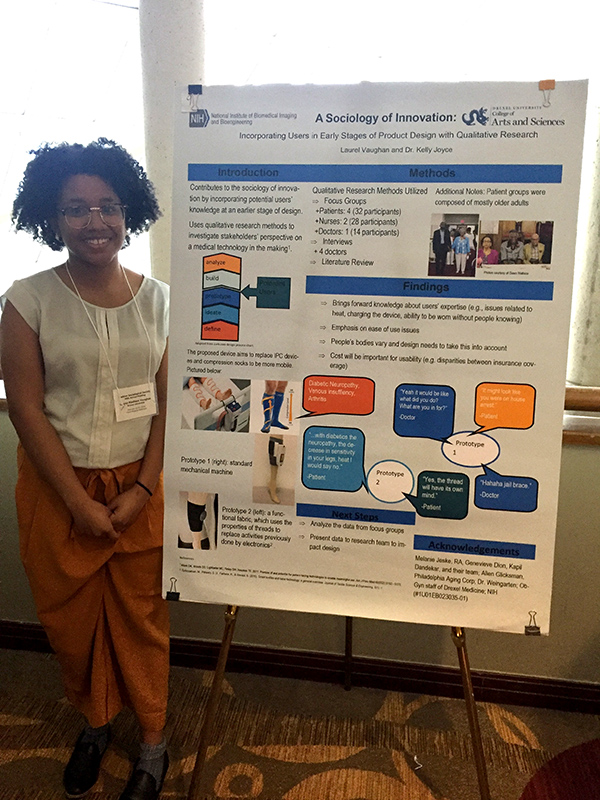Student Spotlight: Data Science Major Brings Users into Design in STS Research Co-op
March 16, 2018
Stephanie Oppenheim, a sociology major and minor in science, technology and society, sat down with data science major Laurel Vaughan to talk about Vaughan’s STS research co-op. The co-op was funded by National Institutes of Health (NIH) Award #1U01EB023035-01 with Kelly Joyce, PhD, professor of sociology and Director of the Center for Science, Technology and Society.
 Laurel Vaughan presents original research from her Drexel Co-op at the Eastern Sociological Society’s Annual Meeting.
Laurel Vaughan presents original research from her Drexel Co-op at the Eastern Sociological Society’s Annual Meeting.
SO: Describe your research co-op for us.
LV: I work full time as a research assistant on an NIH funded project for a mobile smart compression device. We have been conducting focus groups to investigate what people think about two prototypes of the mobile smart compression device and whether it will support their daily routines. My STS research co-op is focused on people and learning how to scientifically investigate their views.
Part of the project involved going to Philadelphia’s senior centers and conducting focus groups with elders. They brought up a lot of great points (e.g., insurance coverage, cost, additional potential users of the device, the dangers of heat for people with diabetic neuropathy) that the engineers and designers hadn’t thought about. They also brought their life experiences and knowledge to the table, which was cool. When we present the findings to the engineering/design team, we will make sure to emphasize the seniors’ opinions and concerns with the prototypes.
SO: Can you explain a little bit about the mobile smart compression device?
LV: The Drexel team designed two prototypes that could potentially replace compression socks and compression machines used in hospitals. One prototype is a smart textile, which incorporate electronics with the properties of threads to carry out a certain task. The prototype includes threads that heat up and contract to create compressions on patients’ lower legs. The other prototype is a motorized box with sensors that detect movement. If a patient isn’t moving, the sensors activate a compression. Both devices are wireless, which allows people to move more freely. The hope is that the new wireless device will help keep blood flowing and thus help prevent Deep Vein Thrombosis (DVT) and water retention in lower legs.
SO: What kind of work do you do with Dr. Joyce?
LV: My work as a research assistant varies every day. Initially, I did background research on smart textiles, compressions socks and DVT. I also helped organize the focus groups and recruit participants. More recently, I have been transcribing the focus group recordings. Once that is finished, we will analyze the data to better understand user feedback. Then, we will report key findings to the engineering/design team to inform them about which prototype was better and what kinds of improvements can be made to better reflect users’ needs and knowledge.
SO: How did your co-op enhance your Drexel experience?
LV: You figure out what you want to do or not do, career-wise, when you’re on co-op. After this experience, I am leaning towards research. As a data science major with a lot of interests, it’s hard to narrow down to one specific research area, but I am very interested in public health and the interaction between medicine, nutrition and the environment. Working with the Center for STS exposed me to a lot of different opportunities that Drexel has for undergrads.
SO: What did you find valuable about your STS research co-op?
LV: I learned how to work with others from different backgrounds and with different personalities. Coming from more of a technical background, it was helpful to learn social science skills that will be useful in future jobs. I learned how to conduct focus groups, transcribe audio and analyze qualitative data. Because of this co-op, I am considering pursuing an accelerated BS + MS with an MS in STS.
SO: What kinds of knowledge does STS bring to innovation?
LV: For innovation, STS helps by looking at user groups and saying, “Hey, we are making this technology and we need your input to make sure it works for you.” It humanizes science by taking into account the person who is going to use a technology.
SO: Why should other students be involved in STS?
LV: It’s a new, exciting field. I think that an introductory course should be required for all STEM majors. I have met a lot of STEM majors who are interested in using technology or science for the public good, but they are only trained in STEM. They don’t have the tools to take communities into account. Taking the Intro to STS class would equip them with the right tools to work towards their goals of bettering communities.